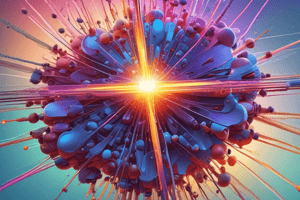Podcast
Questions and Answers
Dielectrophoresis force depends on the presence of electric field gradients
Dielectrophoresis force depends on the presence of electric field gradients
True (A)
In DEP, the force is influenced by the polarity of the electric field
In DEP, the force is influenced by the polarity of the electric field
False (B)
AC fields are preferred in DEP to enhance electrophoretic forces
AC fields are preferred in DEP to enhance electrophoretic forces
False (B)
High field gradients are essential in DEP for large particles to overcome Brownian motion
High field gradients are essential in DEP for large particles to overcome Brownian motion
To achieve high field gradients in DEP, one can use electrodes with large sizes and spacing
To achieve high field gradients in DEP, one can use electrodes with large sizes and spacing
High electric field strengths are needed in DEP applications to induce potential heating effects
High electric field strengths are needed in DEP applications to induce potential heating effects
Imaginary unit 𝑖 is used in the context of complex permittivity.
Imaginary unit 𝑖 is used in the context of complex permittivity.
Electric field lines are generated when an electric field is applied across two electrodes.
Electric field lines are generated when an electric field is applied across two electrodes.
Dielectrophoresis involves the polarization of a polarizable particle in a uniform electric field.
Dielectrophoresis involves the polarization of a polarizable particle in a uniform electric field.
The permittivity in vacuum is represented by ε0 = $8.854187 * 10^{-12}$ F/m.
The permittivity in vacuum is represented by ε0 = $8.854187 * 10^{-12}$ F/m.
Mirco and Nanosystems is a publication that covers topics related to Microfluidic Systems and Bio-MEMS.
Mirco and Nanosystems is a publication that covers topics related to Microfluidic Systems and Bio-MEMS.
Complex permittivity describes the response of materials to an applied electric field considering both real and imaginary components.
Complex permittivity describes the response of materials to an applied electric field considering both real and imaginary components.
The induced dipoles M lead the electric field E by an angle in electrorotation.
The induced dipoles M lead the electric field E by an angle in electrorotation.
In electrorotation, the interaction between the electric field and the trailing dipoles induces a torque H in the particle.
In electrorotation, the interaction between the electric field and the trailing dipoles induces a torque H in the particle.
Phase shift in electrorotation is represented by the real part of fCM.
Phase shift in electrorotation is represented by the real part of fCM.
In electrorotation, applying a fast rotating electric field causes the particles to levitate.
In electrorotation, applying a fast rotating electric field causes the particles to levitate.
N-DEP is required for electrorotation to occur in microfluidic systems.
N-DEP is required for electrorotation to occur in microfluidic systems.
Trailing relaxation of dipoles plays a significant role in inducing rotation in electrorotation.
Trailing relaxation of dipoles plays a significant role in inducing rotation in electrorotation.

